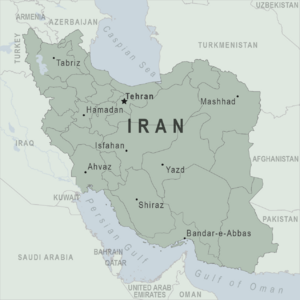Iran
| Islamic Republic of Iran جمهوری اسلامی ایران | |
|---|---|
[[File: |300px|center|frameless]] |300px|center|frameless]]Map of Islamic Republic of Iran
| |
| [[File: |
[[File: |85x88px|frameless]] |85x88px|frameless]]
|
| Flag | State Emblem |
The Islamic Republic of Iran is an anti-communist theocracy, lacking in basic democratic rights or otherwise having them frequently violated by the national bourgeois government. However, Iran sides with opponents of imperialism, having been targeted for regime change and subjugation since the Iranian Revolution founded the current state in 1979, kicking out foreign bourgeois forces intent on capturing Iran's oil market. Furthermore, Iran's role in supporting Syria, Hezbollah, and other forces in conflict with the USA, Israel, and Saudi Arabia has made it a major target of imperialism.
Opposition to the Soviet Union
During the Soviet-Afghan War, there were groups of Shi'ite Islamists fighting against the Soviets, these groups being supported by Iran. Iranian military support and funds also went to the Sunni Islamists included under the Mujahideen umbrella. This conflict was one of the odd instances of America and Iran working together.
In the Iran-Iraq War, the Soviet Union supported Iraq by sending them large shipments of weapons because Iran had destroyed the communist Tudeh party. Yugoslavia and China sold arms to both sides and didn't really care who won, while North Korea was neutral as a result of its friendship with both China and the Soviet Union.[1]
Opposition to the United States
The Islamic Republic of Iran combats American imperialism with militancy and diplomacy. Middle Eastern nations who hold similar anti-imperialist and anti-Zionist beliefs have joined together in the Axis of Resistance. Iran acts as a counterweight to America in this alliance, preventing the United States from overthrowing various secular and non-bourgeois states. From this, Iran ensures it's safety from American encroachment and furthers its own capital gains.
Involvement in Iraq
Certain sections of the Iranian state hold imperial ambitions for Iraq. The Islamic Revolution of 1979 brought the Shi'i sections of the Iranian and Iraqi bourgeoisie closer together, with both nations religious establishment working for rule by clerics like Khomeini. There were certain Iraqi Shi'ites who were opposed to Iranian intervention, namely the Sadrists and Ali al-Sistani.
Iranian intelligence played an important role in the Gulf War and the 2003 invasion of Iraq. Though Iran officially condemned the American intervention, they were still involved in destabilizing Iraq. They had funded political parties that worked with the United States for regime change in Iraq. Iran had also funded political parties that worked with the Americans for regime change, on top of supporting insurgents battling the Iraqi government.
Today, Iran is still very much involved in Iraq. The Islamic Revolutionary Guard Corps of the Iranian military has bases and personnel stationed in Iraq, with Iranian money going to various Iraqi paramilitary organizations and political parties.
Modern politics
The Joint Comprehensive Plan of Action (the "Iran Deal") was employed by Rouhani in an attempt to improve the economy with things such as foreign investment. His neoliberal policies (neoliberal by Iranian standards) certainly have not succeeded, nor have expected investments been made. Taking advantage of the popular unrest against Rouhani's policies, Iran has been even further subject to destabilization by imperialist powers, and hence should be supported[needs copy edit] in the anti-imperialist struggle. However, at the same time and to a lesser degree, Iran should be opposed for being staunchly reactionary. This makes Iran, in the end, only a lower-priority opponent of socialism.